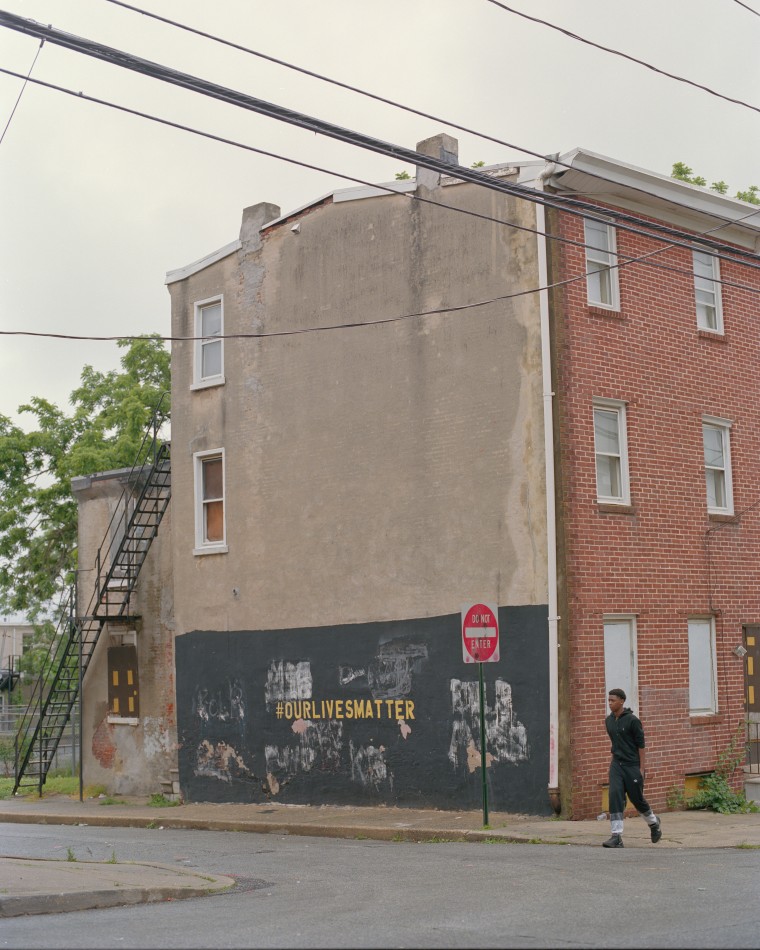 Wilmington, Delaware in 2017.
Wilmington, Delaware in 2017.

It's late on the morning of Memorial Day, the unofficial start of summer, but the sky in tiny Wilmington, Delaware, is gray, and the rain drizzles on and off. All is quiet on Market Street, the main commercial drag, except for a few intrepid grillers in front of Dudes Haircuts, dutifully tending to sausages, and one kid cockily wheeling his bicycle down the middle of the road. A few blocks away Josh, 16, and Seda, 19, both students and aspiring rappers, stand around and shoot the shit.
Seda, a.k.a. Young Seda, frantically mop-topped and quietly confident, reminisces about his ethical eating days: "Man, I went vegan once. For a day. It was, like, the best day of my life!" Josh, a.k.a. JRell, tall and lean and buoyantly irrepressible, busts on his friend: "The open mic lady the other day, she was asking us all about our career aspirations and stuff. Then she turns to Seda and is like" — here he rolls into a massive, wheezing laugh — "'What kind of shoes are those?'"
Before long, the conversation turns to gun violence. Josh knows a girl, an 18-year-old, who was recently shot. "Her brother was affiliated," he says. "Instead of getting him, they got her. I went to middle school with her. We used to sit next to each other in math. She was cool."
“Is she OK?” I ask.
“She’s gone,” he answers, flatly.
“How does that make you feel?” asks Richard Watson, in a tempered, commanding tone. Richard, a.k.a. Richard Raw, is a local musician and community activist. Through his arts non-profit Beyond Those Bars, he’s something of a mentor to these two.
“It’s depressing,” Josh says. “People from outside look at Wilmington like, ‘Damn. I never want to have to go that place, ever, ever.’” He had a show recently on the north side of town, where he grew up; his girlfriend’s mom refused to let her attend. “She was like, ‘I ain’t letting you go to nobody’s hood!”
Her family is from nearby Philadelphia, Josh explains, and slowly a grin and that wheezing laugh return. “And they from the bad side of Philly! I don’t understand!”
Wilmington, with a population of just over 70,000, has long struggled with the stigma of gun violence. In 2014, citing its per-capita violent crime rates (at that time, third-worst nationally among cities of comparable size) Newsweek dubbed Wilmington “Murder Town USA.” To the resentment of the residents, the name proved resonant; ABC even briefly developed a Murder Town TV show starring Jada Pinkett Smith. That same year, scientists from the Centers for Disease Control and Prevention came to Wilmington to study its gun violence as an epidemic.
Incidents of violence have risen in the years since, according to tracking by reporters at Delaware’s News Journal. In 2016, with 21 homicides, Wilmington had roughly the same per capita murder rate as Chicago. And as of June, with half a year to go, there were already 19 homicides recorded in Wilmington in 2017.
Throughout the country, gun violence is said to spike in the summer. While there are statistics to back up the claim — the Centers for Disease Control and Prevention identified this as a national trend in the early eighties — more than anything, the assertion is a bit of folk knowledge. Ask people that grew up in certain parts of St. Louis, or Detroit, or Baton Rouge, and they’ll tell you about that one really bad year, that one really bad season.
On his 2016 track “Summer Friends,” Chance the Rapper gives us the bittersweet feeling of a South Side Chicago summer. First, we get the comforting season signifiers: tank tops, jolly ranchers, fried chicken, socked feet running on concrete. Then, the curdle. “We was still catching lightning bugs/ when the plague hit the backyard,” Chance raps. “Had to come in at dark/ cause the big shorties act hard.”
The clichés of an Americana summer are clear and well-worn: the goofy nothingness of a Slip-n’-Slide, the placid idyll of a bike lolling around a cul-de-sac, the wild spray of a popped fire hydrant. Those clichés are rooted in a tacit, sweet promise: that on summer vacation, a human can live truly and fully free. But for some American kids, that luxury is not afforded. For some American kids, the season promises both escape and a burbling, prickling fear. What’s it like to live where summer is a trap?
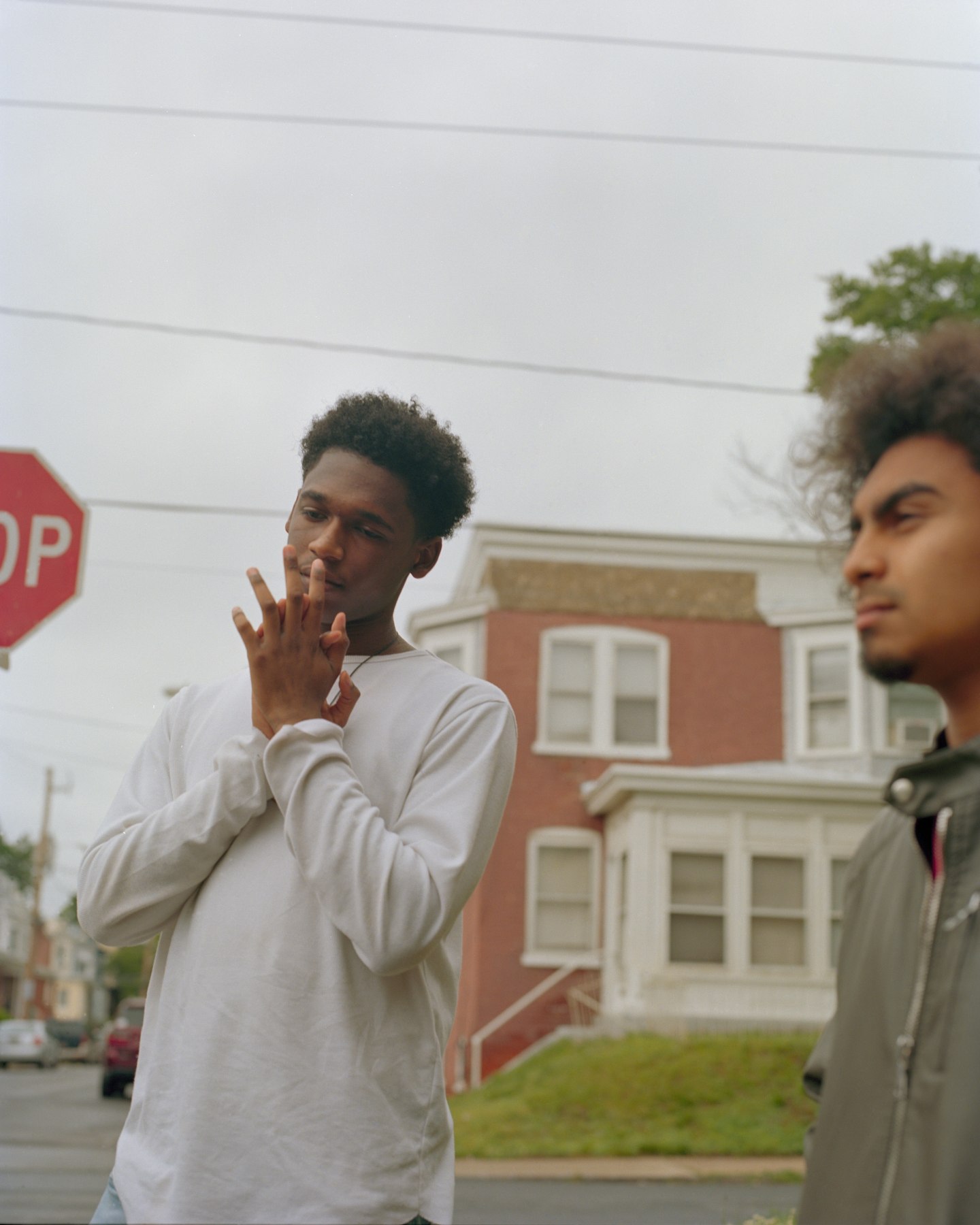 Wilmington, Delaware teenagers Josh (L) and Seda (R).
Wilmington, Delaware teenagers Josh (L) and Seda (R).
The day kicks off. We hop in Richard’s car to see the city and to snap photos. Josh’s dad, Joshua Sr., a plump man wearing a novelty T-shirt featuring a paranoid alien, happily follows along with an SLR camera: “He call himself a rapper, so I’m just trying to do my support!” We drive through residential neighborhoods where we see almost no one outside. Then, again and again, we hit “hot spots,” as Richard calls them: thin streets of decrepit, boarded-up homes where clusters of young people in Nike dad hats and thin gold chains hustle. “This is where you can come and get whatever you need,” he says as we cruise by slowly.
Suddenly, we’re in a lush part of town, where mansions blossom and lawns stretch forever, where frisbees get tossed and joggers trot, where men in visors post up by Jeeps to drink domestic light beer. DuPont, the chemical giant, has been headquartered in Wilmington since 1802 and has boosted the fortunes of Delaware families for generations. That’s the stark thing about Wilmington: in this town, the country’s baseline national inequality — our two Americas — exist just blocks apart.
Minutes later, we’re back on the West Side. Richard greets a 10-year-old bouncing a basketball solo against a brick wall. The first words out of the young man’s mouth: “Buy me a fidget spinner?” Our crew cracks up. Then we stop in front of a homespun memorial for a man named Mase, who was killed a few years back.
“RIP Ma5e The LEGEND,” reads the scrawls of black spray paint. “LOVE YOU DAWG.” We see similar shrines throughout the city, most of them weathered but hanging on: balloons gone flat, pinned-up teddy bears run ragged in the rain, unlit prayer candles, empty glass bottles of Hennessy and Amsterdam Vodka.
Joshua Sr. grew up just down the street. In his day, the central hub was called the Forklift. “That’s where all the crack was sold at,” he says, pointing a finger. “I remember playing football in this alley right here, and these two dudes got into an argument, and then one of them — pop pop pop. We ran, of course. I don’t know what happened after that! We just ran.”
A few years back, Joshua Sr. moved the family to New Castle, a few minutes drive south of Wilmington. It’s relatively quiet, but not itself free of violence. “When I lived down here,” Josh explains, “I didn’t really come outside. And when I did come outside, I went around the corner and that was it. And that was just me riding my bike on the sidewalk and around the corner ... I try to stay in the house. Or be in before the sun even thinks about going down.” Seda nods: “Be in the house before the street lights go on. Have a ride back home instead of just walking. The summer’s crazy.”
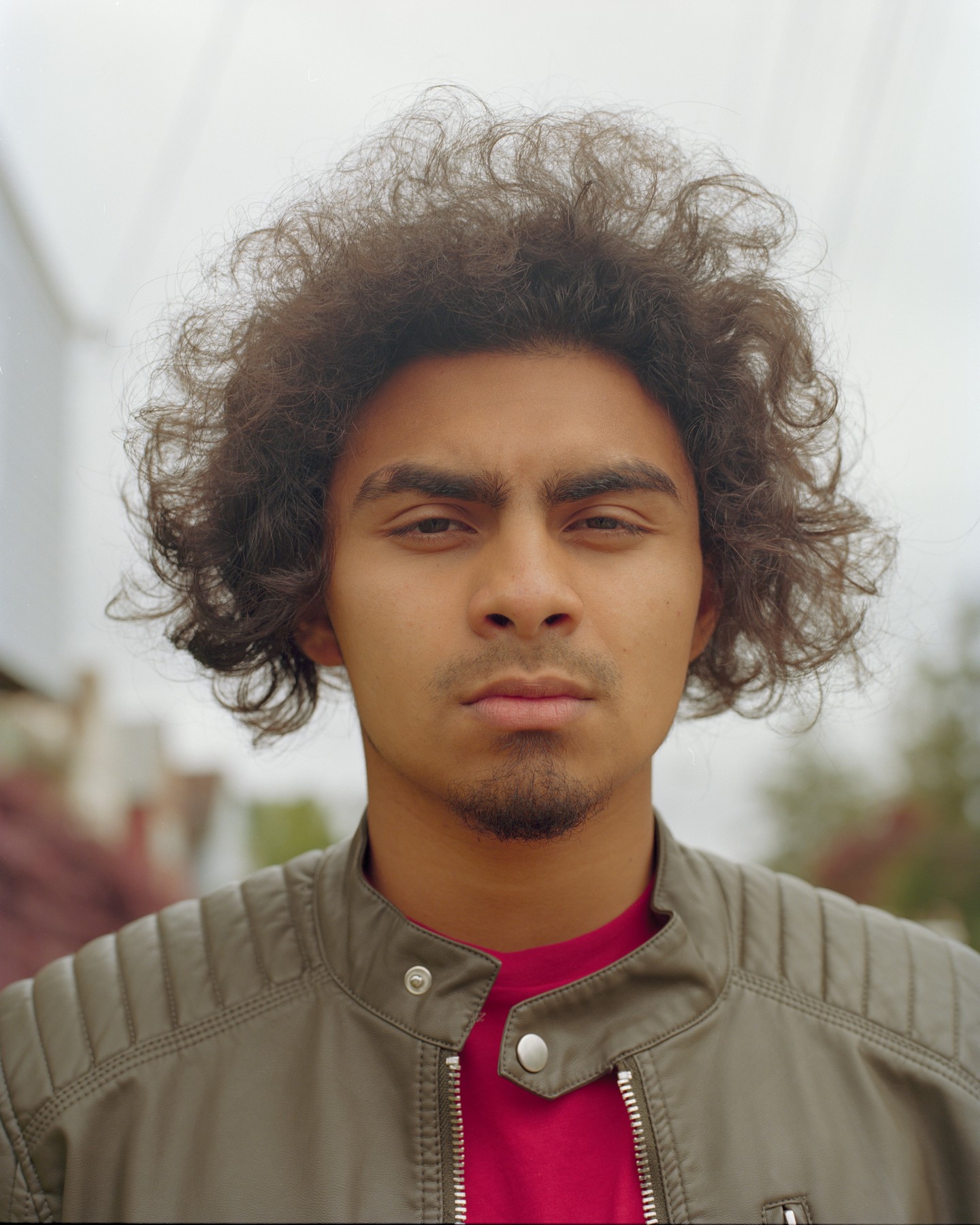 Wilmington, Delaware teenager Seda.
Wilmington, Delaware teenager Seda.
In New Castle, Joshua Sr. says, “the parks is where it happens at.”
“We play basketball in those parks,” Josh says. “We seen fights. We went out there [on] Fourth of July, popping firecrackers, dude came outside like, ‘Yeah, we gon’ pop off some of our own firecrackers!’ Starts shooting a gun down the pathway. It’s just random, weird stuff that happens.” That reminds Seda of a similar story, of when he was 10, and walking past a hot spot known as the Horseshoe. “This guy, he was real tall, had dark shades, big coat, dreads. He pulls out a gun and let off like 12 bullets. For no reason.”
Quietly, Seda moves to express a private thought. “I kinda wanna know how it is to live in different cities, different states. I lived here my whole life. So, like, when people talk about Wilmington, how bad it is, I’m just like — how bad is it?! It’s kind of, like, normal.”
Earlier, Richard had sketched out the major policy decisions that had repeatedly damaged Wilmington’s black community. He explained how the Housing Act of 1949 displaced black-owned businesses, and how the construction of I-95 a few years later displaced those folks all over again. Patiently, he pointed Josh and Seda to the root causes of Wilmington’s inequality, and how Wilmington’s crime and violence are born out of that inequality — how those things did not just always exist.
Hearing Seda speak now, Richard becomes pained to make his point again. “With nothing to compare it to, it becomes normal. This is not a normal life! For any of y’all.”
Josh, shruggingly, disagrees. “It’s like knowing your shower is broken, so you gotta” — he makes a motion with his elbow, a kind of quick jerk to the side — “you gotta twist it the other way.” You just get used to it after a while.
I bring up the televised summer clichés. Do you resent not having any of those things? Sleepaway camp? Swimming in creeks? Josh breaks out a hard laugh. “Swimming in creeks? Swimming in bathtubs!”
Almost on cue, we hear the jingle and spot the comfortingly familiar signage of a Mr. Softee.
“Ice cream truck!” Josh yelps.
Seda takes it in, then shares what’s on his mind: “Yo, I don’t know if it be like this in other states, but I hear the ice cream truck — they be selling stuff."
Josh thinks for a beat, then nods. “They probably do, yo!”
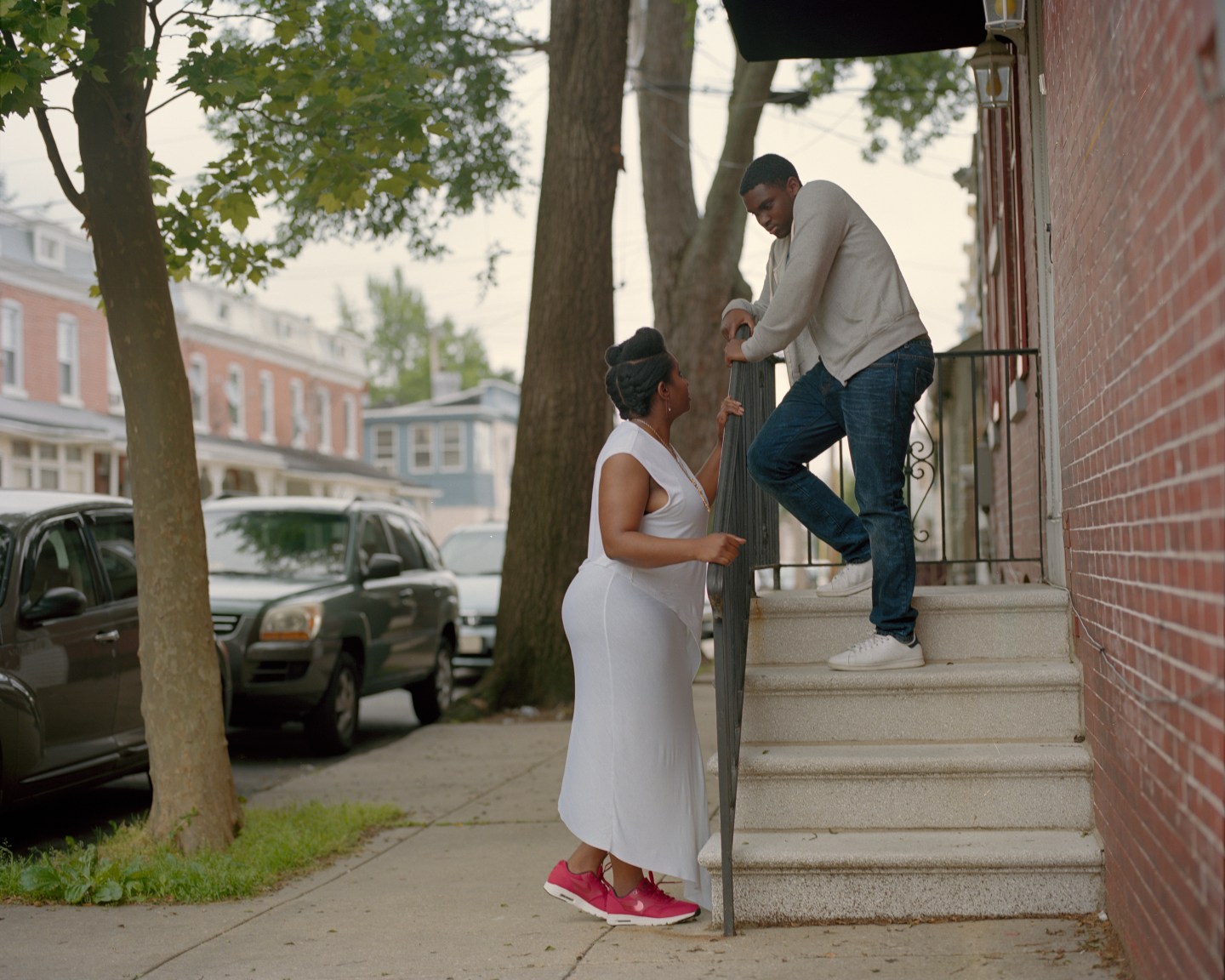 Nataki and her son, Nasai, in Wilmington, Delaware.
Nataki and her son, Nasai, in Wilmington, Delaware.
In the afternoon I meet Nasai, 15, bright and handsome in his gray hoodie, and his mother Nataki, 38, elegant in sneakers and a long white dress. They’re friends of Richard’s as well. We sit in the living room of their cozy, well-tended three-floor home, their tiny Bichon Frise, Mango, yapping away at our ankles.
“We were all raised in my great-grandmother’s house,” Nataki says, “but the city changed. One night, the reality hit when somebody let off — it sounded like a sawed-off shotgun. Probably 8, 9 o’clock at night. And I grabbed him and we hit the floor."
Nasai was nine at the time. “It was so close,” Nasai says. “It sounded loud enough that it could have been our house.”
In the years after, violence would hit closer. An ex-boyfriend of Nataki’s, Darius, was killed, and Nataki is still close with the family: “His mom is numb. She talks about it every single day.” Nataki’s good friend lost a son, Brandon, not that long ago. Nataki shows me the commemorative button: Brandon’s face in the clouds, smiling. In cursive font below, the words “Turn y’all savage up! Stop crying & smile for me!”
“Brandon’s mother, she’s angry, extremely angry,” Nataki says, “and whether the [killer] gets a gazillion years or not, it’s bad forever. It’s horriible forever."
Nataki now says she’s stopped going to funerals, stopped wearing RIP shirts; Nasai personally has never been to a funeral. Methodically, deliberately, they carve out their own lives separate from the stigma.
“Pour life back into these young males,” she seethes. “I don’t care about popularity, degrees, positions, titles, or events, get off your asses and get to work.”
This summer Nasai will be working a city job — a coveted position in his age group — and tending to his true passion: his beverage business Myster Lemonade (the recipe is an old family secret). He has restless entrepreneurial dreams and hopes of international journeys to come. “You want to go different places, you want to do different things. All my friends ask, ‘Why don’t you go outside?’ It’s because I don’t see the need in wanting to go outside. I wanna go to California! I wanna go to Mexico! You know what I’m saying?”
Meanwhile, Nataki says, she has worked hard to make their home a sanctuary for them both. It’s always been just the two of them; over the years they’ve found themselves living in parts of town they would have rather avoided. But, Nataki explains, “It didn’t really matter where we lived, as long as we felt safe within the home.”
We step outside to take in the neighborhood. A few blocks away is Market Street and the city’s squeaky clean downtown. A few blocks in the other direction is Bennett Street, a well-known hotspot that Nataki forbids Nasai from entering. Charly Black’s dancehall banger “Gyal You A Party Animal” blasts from a nearby porch. A dad chases his toddler down the street, shouting, “Hold up! Poo poo! Gotta change your Pampers!”
Nataki knows seemingly every person that passes: she squeezes friends hello, shouts “Congratulations!” to a nearby driver. We talk about the famous Delaware beaches; the big parties — Clifford Brown Jazz Fest, St. Anthony’s Italian Festival — that go down every summer; the step crew that impromptuly marched down this street just the day before. “I love my city, I really do!” Nataki says. A police cruiser goes down toward Bennett, and Nataki wonders: “Why don’t the cops ever get out of their car and talk to people?”
At one point, a woman with multicolored facial piercings walks by in a hurry. “You going to the game?” Nataki asks. “You know I am!” the woman says. They’re playing Pitty Pat in a house down the street, Nataki explains to Nasai and me. It’s a card game, and they’ll certainly be gambling good money on it. In fact, the games go all night, and the house serves breakfasts and dinners to players, and even takes a cut of the action.
At this, Nasai’s precocious business instincts are piqued. “We should get into that!”
A few days after I visit, a 6-year-old boy will be shot in the head a few blocks from where we’re now standing. Nataki texts me “I think I missed a very vital piece to the solution” along with a link to a Facebook post she wrote. It’s a rejoinder to the self-restraint she presented in person: it’s blunt, embittered, seething with anger. “POUR LIFE BACK INTO THESE YOUNG MALES,” she writes. “I don’t care about popularity, degrees, positions, titles, or events GET OFF YOUR ASSES & GET TO WORK.”
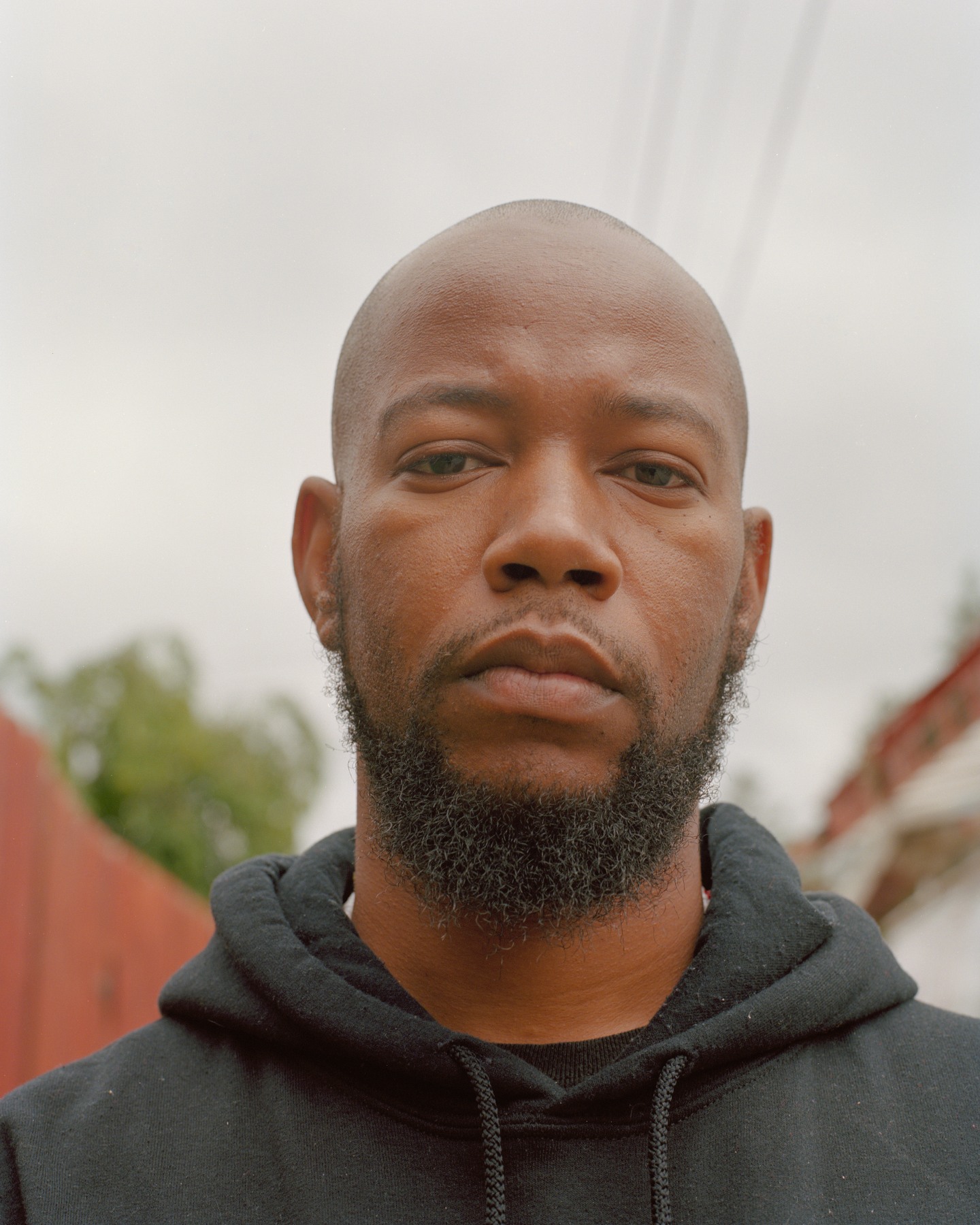 Wilmington, Delaware's Richard Raw.
Wilmington, Delaware's Richard Raw.
As evening approaches, I’m back with Josh and Seda out in front of Richard’s house on the North Side. With his dad snapping, Josh poses for photos, doing his best to look hard; meanwhile, Seda does his best to make him laugh: “You play in abandoned houses!” A box of Cinnamon Toast Crunch has materialized in Josh’s hand, and Seda then switches to instructing him how to properly utilize it as a prop: “Lift your leg, get lower, pop up the box! Show the peace sign!”
Playing the part of an ascendant rap star, the box flush with his ear in place of the de rigueur fat stack of cash, Josh riffs. “Man, you already know, follow me on SoundCloud, JRell302.” Tipping himself a mouthful, he talks and chews. “What they gon’ tell me ... back in the day ... we couldn’t eat cereal ... now? I’m up!!!”
Hearing this, it’s Joshua Sr.’s turn to let out a long, rumbling laugh. “You up cause you eat cereal?!!”
Josh, with a faint smile, ignores him. “I should have gotten some Coco Puffs. Cap’n Crunch. They had all types of stuff in there.”
A block down, a cluster of tykes assemble, yanking each other down to the grass by the striped tee, popping up pink bikes, screaming and laughing with wide-open mouths and wide-open eyes and the glee of true abandon. The sky is still splotchy and unpromising, but the rain has stopped at least, and out of the clouds pokes the tiniest wisp of sun. There was a shooting in the city the day before; there will be a shooting the day after. But today, there is a calm.
 Wilmington, Delaware in 2017.
Wilmington, Delaware in 2017.